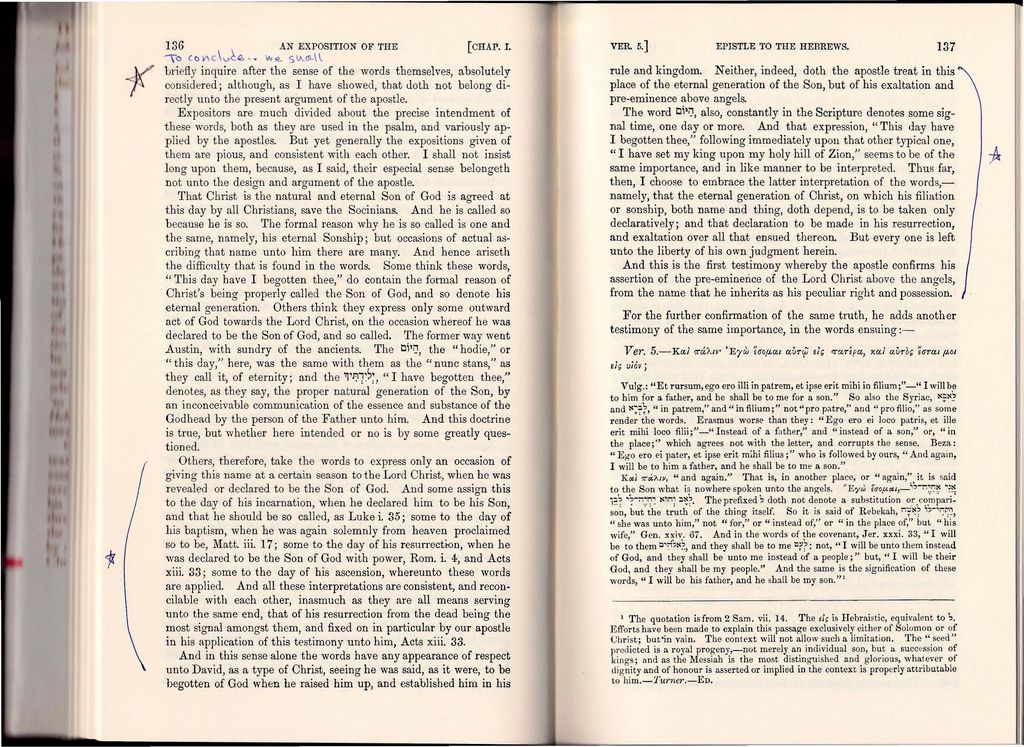Stope
Puritan Board Sophomore
Im reading Hebrews chapter 1, and in doing so I dont want to read into it what's not there - I indeed believe that Jesus is God, but as I read Hebrews ch. 1 (and trying the best i can to read it as a first century Jew), I cant help but think the face value interpretation 1:4-9 is that Jesus is indeed superior and has attributes of God, but is a literal son. Please see below my thoughts in italics and share any insight where I err:
4 having become as much superior to angels as the name he has inherited is more excellent than theirs.
-----In "having become" it appears that he wasnt at one point prior to his life on earth in possession of a more excellent name than the angels. That is, if He was ALWAYS God then would he not ALWAYS have had a more superior name?
----What is meant by the fact that He "Inherited" this superior name?
5 For to which of the angels did God ever say,
“You are my Son,
today I have begotten you”?
----I know that Jesus eternally progress through the Father, but at face value this appears that "today" it again seems that at one time he was NOT the son
----What is meant by "begotten"? And when I ask this I am very curious as to what a first century Jew would think of this?
Or again,
“I will be to him a father,
and he shall be to me a son”?
-----Again, the timing issue here: that is, it appears at one point Jesus was NOT a son
6 And again, when he brings the firstborn into the world, he says,
“Let all God's angels worship him.”
-----I know "firstborn" represents status, but It would appear that "bringing" the "firstborn" into the world is a more literal "firstborn" as in the chronologically first born son
7 Of the angels he says,
“He makes his angels winds,
and his ministers a flame of fire.”
8 But of the Son he says,
“Your throne, O God, is forever and ever,
the scepter of uprightness is the scepter of your kingdom.
9 You have loved righteousness and hated wickedness;
therefore God, your God, has anointed you
with the oil of gladness beyond your companions.”
-----Given all the confusion for myself that I mentioned above, I would see here in these verses (as well as in the first 3 verses of Ch 1) that at face value Jesus is God, and thats what makes the "son" talk in above passages so confusing
Any thoughts would be a blessing
4 having become as much superior to angels as the name he has inherited is more excellent than theirs.
-----In "having become" it appears that he wasnt at one point prior to his life on earth in possession of a more excellent name than the angels. That is, if He was ALWAYS God then would he not ALWAYS have had a more superior name?
----What is meant by the fact that He "Inherited" this superior name?
5 For to which of the angels did God ever say,
“You are my Son,
today I have begotten you”?
----I know that Jesus eternally progress through the Father, but at face value this appears that "today" it again seems that at one time he was NOT the son
----What is meant by "begotten"? And when I ask this I am very curious as to what a first century Jew would think of this?
Or again,
“I will be to him a father,
and he shall be to me a son”?
-----Again, the timing issue here: that is, it appears at one point Jesus was NOT a son
6 And again, when he brings the firstborn into the world, he says,
“Let all God's angels worship him.”
-----I know "firstborn" represents status, but It would appear that "bringing" the "firstborn" into the world is a more literal "firstborn" as in the chronologically first born son
7 Of the angels he says,
“He makes his angels winds,
and his ministers a flame of fire.”
8 But of the Son he says,
“Your throne, O God, is forever and ever,
the scepter of uprightness is the scepter of your kingdom.
9 You have loved righteousness and hated wickedness;
therefore God, your God, has anointed you
with the oil of gladness beyond your companions.”
-----Given all the confusion for myself that I mentioned above, I would see here in these verses (as well as in the first 3 verses of Ch 1) that at face value Jesus is God, and thats what makes the "son" talk in above passages so confusing
Any thoughts would be a blessing

